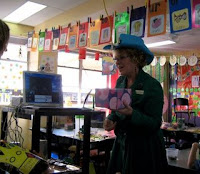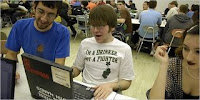
Wow, what an inspiration Randy Pausch's Last Lecture was! He accomplished so much and he was my age. He's an inspiration and what a great attitude he had even though he was dying (I loved the part where he did the push ups). I think it was his positive attitude towards his students and his sense of humor that impressed me the most. It is incredible how many of his childhood dreams he actually accomplished. Most people are lucky to attain one of the goals they set for themselves. I loved how he said he learned the most from the dream he didn't accomplish..playing in the NFL. "Experience is what you get when you didn't get what you wanted".
He gave his students the freedom to accomplished even more that he imagined and they didn't let him down. The projects they worked on were incredible. He used criticism to inspire the students to push themselves beyond their self-prescribed limits and it worked! When they blew his mind with first assignment he had to find a way to raise the bar and they just kept performing and performing! It is a testament to Dr. Pausch as an instructor that the students are being promised jobs even before they enter the program...now that's something! He has the program set up so the students learn while also having fun. What a great way to motivate students.

Randy Pausch also gave us some great advice. My favorite tip of his was to decide whether you are a Tigger or an Eeyore. Do you want to enjoy life and have a postive attiude or be a gloomy gus? Randy Pausch was definitely a Tigger in a world full of Eeyores, a bright light in a dark room. I like the head fake concept. I think a lot of what children learn is indirectly. As a parent I also think that children learn more from what you do than what you say.
His second head-fake took me by surprise. The lecture could have been directed at any college class, any group of students or at a teacher's conference but it wasn't. The lecture, his last, was his legacy for his own children. I was really moved the way he accomplished so much and became so wise in his short lifetime.
I also think the head-fake is a great way to approach teaching. The students are learning indirectly- they think they are learning one thing when they are really learning something else. My favorite way to teach would be the methods he used where the students are having fun and don't realize they are learning....and working! This is something I want to try to do myself when I get in the classroom.
I also believe, like Dr. Pausch, in giving students some freedom to explore and discover what they are capable of. I love open-ended assignments where students are given choices and allowed (and encouraged) to think. When approaching learning in this way, the students will almost always surprise you. I loved how Randy Pausch's students blew him away but he couldn't let them know that. Always have high expectations for your students and help them reach beyond what they think they are capable of and they will accomplish more than they (or you) ever dreamed!












